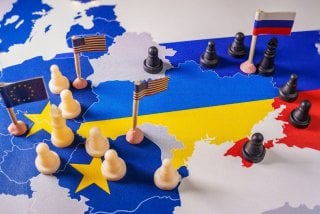Russia’s Recruitment of Central Asians Could Backfire on Moscow
Moscow is engaging in risky activity by singling out vulnerable Central Asian migrants to support its war efforts in Ukraine.
As Russia wages its unjustified war against Ukraine, Moscow has disproportionately sent its ethnic minorities to the fight, including Buryats, Tuvans, Chechens, Dagestanis, and various Central Asians. While all Russian citizens have been fair game for Russian military mobilization, Moscow has gone further by incentivizing and, in some cases, forcing Central Asian migrants to serve in the war in Ukraine to receive Russian citizenship. In response, Central Asian countries, which have tried to remain neutral throughout the Russo-Ukrainian War, are taking measures to reduce the number of their citizens being thrown into the fray.
Russia’s recruitment efforts of foreign migrants stem from its worsening demographic issues. Russia has struggled with demographic issues for over thirty years, but the war in Ukraine has exacerbated the problem, as women outnumber men by over ten million. The Russian military has sustained more casualties in the Russo-Ukrainian War than in a decade of war in Afghanistan in the 1980s or two campaigns in Chechnya in the 1990s. Additionally, in 2022, around 155 thousand Russians received temporary residency permits in Europe, Turkey, and former Soviet republics.
To compensate for these losses, Central Asians are prime targets for the Russian war machine. Russia hosts around nine million Central Asian migrants hoping to earn higher salaries than their home country. However, Central Asians are often exploited by employers and experience low standards of living, unsafe and exhausting working conditions, and poor health services. On top of this, Central Asian migrants have been subjected to arbitrary detention by Russian authorities. Central Asians are among the 50,000 prisoners in Russia who have volunteered or faced coercion to fight in Ukraine as part of the Wagner Group.
Moscow maintains significant political pressure on Central Asia. Given that Central Asian countries primarily rely on Russia for security, it is difficult for these countries to be forthright in their rejection of Central Asians being pressured to take part in the Russo-Ukrainian War. Despite this, the governments of Kyrgyzstan, Kazakhstan, and Uzbekistan have warned strongly about legal repercussions for citizens participating in foreign wars.
In May 2023, a thirty-one-year-old Kyrgyz man was sentenced to ten years in a court in Bishkek after being found guilty of joining Russia-backed separatists in Ukraine's eastern region of Luhansk. Another Kyrgyz citizen who operated as part of the private mercenary Wagner Group was also detained in August 2023. As Bishkek cracks down on citizens serving in the war in Ukraine, twelve Kyrgyz have been confirmed to have died in Ukraine, while around twenty have been reported missing.
In Kazakhstan, after a Kazakh student said on social media that he had gone to Ukraine to join the Wagner Group, Kazakh foreign ministry spokesperson Aybek Smadiyarov clarified that “there is nothing romantic about it.” “We would like to warn that all citizens who intend or think about going and joining those ranks would face between five and nine years in prison in Kazakhstan, where it is a criminal offense,” he added.
The embassy of Uzbekistan in Russia, in a statement issued on August 10, 2022, declared that any form of participation in military activities on the territory of foreign countries is considered to be mercenary activity and will be punished by up to ten years in prison. This announcement immediately followed a Uzbek migrant leader’s proposition in Perm, Russia, to create a “volunteer battalion” to join the “special military operation” in Ukraine.
Despite Russia being the primary destination for Central Asian labor migrants, Russia’s recruitment of Central Asians to fuel its war in Ukraine may prompt Central Asian countries to find alternative areas where migrant workers can find employment. This would be a significant blow to Russia as Moscow has grown to rely on these workers in various industries.
During economic talks, Uzbekistan and the United Kingdom have discussed collaboration on labor migration. Additionally, Kyrgyzstan and South Korea have signed an agreement guaranteeing additional employment opportunities for citizens of Kyrgyzstan in South Korea. While language barriers may produce difficulties for Central Asian migrants, the popularity of the Russian language in several Central Asian countries like Kazakhstan is declining. Countries offering Central Asian states alternative labor destinations should provide comprehensive language training to ensure the success of these workers.
Moscow is engaging in risky activity by singling out vulnerable Central Asian migrants to support its war efforts in Ukraine. The longer the war in Ukraine drags on, the more strained relations between several Central Asian countries and Russia will likely become.
Alex Little is an MS graduate of Georgia Tech and specializes in Russian and Central Asian affairs.
Image: Shutterstock.

